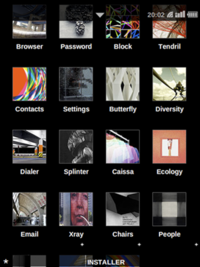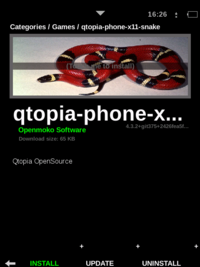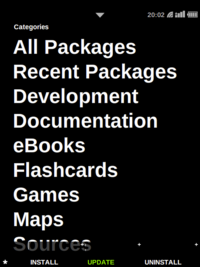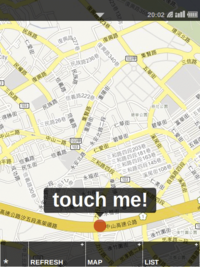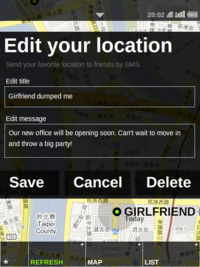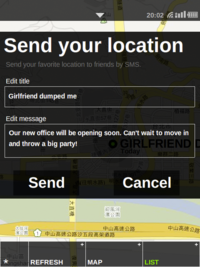Om 2008.8
From Openmoko
Morganglines (Talk | contribs) m (minor spelling updates) |
Marko Knöbl (Talk | contribs) m |
||
| (73 intermediate revisions by 28 users not shown) | |||
| Line 1: | Line 1: | ||
{{Languages|Om 2008.8}} | {{Languages|Om 2008.8}} | ||
| − | |||
| − | + | '''Om 2008.8''' Was the name of the first version of [[Om 2008]]. It was released on August 08, 2008. Om 2008.8 was superseded by [[Om 2008.9]]/[[Om 2008.12]] which were released later that year. | |
| − | = | + | == Known Issues == |
| − | + | This is only a subset, and some of the bits reported below may have been fixed by stable updates (see [http://onlinedev.blogspot.com/search/label/om2008.8%20review Alasal's test reports] as well as the "Updates" section below). See [http://docs.openmoko.org/trac/search?q=2008.8 all tickets with 2008.8] in the bug tracker. | |
| − | + | '''Suspend''' | |
| − | + | Builds from the last days of August tend to suspend after 30s no matter what you set in settings. Switching the screensaver off with `xset s off' disables suspend completely. Note that this command must be typed into the terminal application on the phone itself; if you try to run it from an ssh session it fails with the error `xset: unable to open display ""'. This is because ssh sessions change the display settings expecting you might want X11 forwarding. In fact if you are using X11 forwarding with ssh -Y, the command won't fail over ssh, but it still won't do what you expect, as xset will assume you're talking about the forwarded X11 session, and thus doesn't affect the X11 session on the phone. Therefore if you use a ssh session you need to enter `xset -display :0 s off'. | |
| − | + | Alex reportedly solved the problem going into Illume Settings, then Power, and setting to OFF the 2 parameters. He still gets the screensaver, but can reactivate easily just by touching. | |
| − | + | If resume breaks audio (the ringing of the phone or for calling someone) a very probable reason is that the pulseaudio sound server is installed. This happens e.G. when openmoko-mediaplayer2 is installed. There seems to be [http://lists.openmoko.org/pipermail/openmoko-kernel/2008-August/004877.html activity to fix this application] already, though. | |
| − | + | ||
| − | + | ||
| − | + | ||
| − | + | ||
| − | + | ||
| − | + | ||
| − | + | ||
| − | + | ||
| − | + | ||
| − | + | ||
| − | + | ||
| − | + | ||
| − | + | ||
| − | + | ||
| − | + | ||
| − | + | ||
| − | + | ||
| − | + | ||
| − | + | ||
| − | + | ||
| − | + | ||
| − | + | ||
| − | + | ||
| − | + | ||
| − | + | ||
| − | + | ||
| − | + | ||
| − | + | ||
| − | + | ||
| − | + | ||
| − | + | ||
| − | + | ||
| − | + | ||
| − | + | ||
| − | + | ||
| − | + | ||
| − | + | ||
| − | + | ||
| − | + | ||
| − | + | ||
| − | + | ||
| − | + | ||
| − | + | ||
| − | + | ||
| − | + | ||
| − | + | ||
| − | + | ||
'''GSM''' | '''GSM''' | ||
| Line 67: | Line 19: | ||
* [http://docs.openmoko.org/trac/ticket/1766 Cannot make calls or receive SMS messages] | * [http://docs.openmoko.org/trac/ticket/1766 Cannot make calls or receive SMS messages] | ||
* [http://docs.openmoko.org/trac/ticket/1662 GSM not working properly after x hours] | * [http://docs.openmoko.org/trac/ticket/1662 GSM not working properly after x hours] | ||
| − | * [ | + | * [http://docs.openmoko.org/trac/ticket/1832 Cannot dial numbers starting with * or #] |
'''WiFi''' | '''WiFi''' | ||
| − | + | ||
| − | * [http://docs.openmoko.org/trac/ticket/ | + | * [http://docs.openmoko.org/trac/ticket/1929 WiFi can only connect once] |
| − | + | ||
'''Audio quality''' | '''Audio quality''' | ||
| − | |||
* [http://docs.openmoko.org/trac/ticket/1640 Improve overall audio] | * [http://docs.openmoko.org/trac/ticket/1640 Improve overall audio] | ||
| − | '''System Software''' | + | '''System Software''' |
* [http://docs.openmoko.org/trac/ticket/1736 Boot screen goes into sleep and never wake up if not touch during booting] | * [http://docs.openmoko.org/trac/ticket/1736 Boot screen goes into sleep and never wake up if not touch during booting] | ||
| Line 85: | Line 35: | ||
* [http://docs.openmoko.org/trac/ticket/1315 xglamo: performance decreases after a while] | * [http://docs.openmoko.org/trac/ticket/1315 xglamo: performance decreases after a while] | ||
* [http://docs.openmoko.org/trac/ticket/1682 Neo turns off before reaching x] | * [http://docs.openmoko.org/trac/ticket/1682 Neo turns off before reaching x] | ||
| + | |||
| + | '''QPE high cpu usage''' | ||
| + | * qpe does scan whole filesystem ( including SD card ) for documents , mp3 files , etc. If you don't want it you can edit <tt>/opt/Qtopia/etc/default/Trolltech/Storage.conf</tt> and disable Sd Card scanning ( overwrite 1 by 0 ), i.e. the section in the file should read like this after aplying the change to Om2008.9: | ||
| + | <br><code>[MountPoint0]</code> | ||
| + | <br><code>Name[] = SD Card</code> | ||
| + | <br><code>Path=/dev/mmcblk0p1</code> | ||
| + | <br><code>Removable = 1</code> | ||
| + | <br><code>Applications = 0</code> | ||
| + | <br><code>Documents = 0</code> | ||
| + | <br><code>ContentDatabase = 0</code> | ||
| + | |||
'''Networking''' | '''Networking''' | ||
* No Updates/Installation are possible or pings to domains because DNS is not working. This problem occurs because the /etc/resolv.conf is empty by default. | * No Updates/Installation are possible or pings to domains because DNS is not working. This problem occurs because the /etc/resolv.conf is empty by default. | ||
Add these lines in /etc/network/interfaces: | Add these lines in /etc/network/interfaces: | ||
| − | + | <pre> | |
| − | + | up echo nameserver 208.67.222.222 > /etc/resolv.conf | |
| − | + | up echo nameserver 208.67.220.220 >> /etc/resolv.conf | |
| − | This is to be inserted below gateway address and above the bluetooth networking. After this it will be set on every reboot. | + | </pre> |
| + | This is to be inserted below gateway address and above the bluetooth networking. After this it will be set on every reboot. Note that sending all DNS traffic to these servers lets their administrators follow each and every web site you visit. You might want to consider using the nameservers of your real ISP instead since they can already do such tracking. | ||
For resolving DNS without restarting, run the following commands: | For resolving DNS without restarting, run the following commands: | ||
| − | + | <pre> | |
| − | + | echo nameserver 208.67.222.222 > /etc/resolv.conf | |
| − | + | echo nameserver 208.67.220.220 >> /etc/resolv.conf | |
| + | </pre> | ||
This should solve most of your moko side networking issues. If you need any other help please refer to [[USB Networking]] | This should solve most of your moko side networking issues. If you need any other help please refer to [[USB Networking]] | ||
| − | {{note| [http://en.wikipedia.org/wiki/Resolvconf resolvconf] is installed so should probably be used | + | {{note| [http://en.wikipedia.org/wiki/Resolvconf resolvconf] is installed so should probably be used |
'''Problem''': parts of resolvconf are missing: without the scripts under /etc/network/if-{up,down}.d, and /etc/resolvconf/run/enable-updates and /lib/resolvconf/list-records it does nothing, and even then, /etc/resolvconf/run should probably be a symlink to /var/run, or /etc/resolv.conf needs to be pointed at /etc/resolvconf/run/resolv.conf -- once all that's done, it seems to work as long as you add something like this to /etc/network/interfaces at the end of the usb0 stanza: | '''Problem''': parts of resolvconf are missing: without the scripts under /etc/network/if-{up,down}.d, and /etc/resolvconf/run/enable-updates and /lib/resolvconf/list-records it does nothing, and even then, /etc/resolvconf/run should probably be a symlink to /var/run, or /etc/resolv.conf needs to be pointed at /etc/resolvconf/run/resolv.conf -- once all that's done, it seems to work as long as you add something like this to /etc/network/interfaces at the end of the usb0 stanza: | ||
| − | + | dns-nameservers 192.168.0.200 | |
| − | + | dns-search example.com | |
and add <tt>usb*</tt> above <tt>eth*</tt> in <tt>/etc/resolvconf/interface-order</tt> | and add <tt>usb*</tt> above <tt>eth*</tt> in <tt>/etc/resolvconf/interface-order</tt> | ||
| + | }} | ||
| + | |||
| + | {{Note| '''Solution:''' Steps to add missing resolvconf script: <br> | ||
| + | <code>touch /etc/resolvconf/run/enable-updates</code><br> | ||
| + | <code>cd /etc ; rm resolv.conf ; ln -s /etc/resolvconf/run/resolv.conf .</code><br> | ||
| + | <code>mkdir /lib/resolvconf/ ; cd /lib/resolvconf/</code><br> | ||
| + | <code> | ||
| + | |||
| + | <nowiki>wget http://87.227.108.179/list-records</nowiki> </code><br> | ||
| + | <code>chmod +x list-records</code><br> | ||
| + | Edit <code>/etc/network/interfaces</code> and remove the lines:<br> | ||
| + | <code> network 192.168.0.0</code><br> | ||
| + | <code> gateway 192.168.0.200</code><br> | ||
| + | If we need to use the usb network more then just locally from the computer in the other end of the USB-cable, login with ssh and add a default route like this:<br> | ||
| + | <code>route add default gateway 192.168.0.200</code> | ||
}} | }} | ||
* Usb-networking will not work until rebooted after initial boot. | * Usb-networking will not work until rebooted after initial boot. | ||
| − | '''Usability''' | + | '''Usability''' |
| + | |||
* The Pin-Dialog by default just shows letters. You have to slide your finger up/down over the keyboard to make the numbers/uppercase/special characters appear. | * The Pin-Dialog by default just shows letters. You have to slide your finger up/down over the keyboard to make the numbers/uppercase/special characters appear. | ||
* The installer app doesn't release administrative rights which results in not being able to use opkg. Solution: run "killall packagekitd" (on the freerunner or when ssh'ed in). | * The installer app doesn't release administrative rights which results in not being able to use opkg. Solution: run "killall packagekitd" (on the freerunner or when ssh'ed in). | ||
* The installer app doesn't release administrative rights which results in not being able to use opkg. Alternate Solution: On the FreeRunner, use the drop-down menu to close all open applications. | * The installer app doesn't release administrative rights which results in not being able to use opkg. Alternate Solution: On the FreeRunner, use the drop-down menu to close all open applications. | ||
| + | * The keyboard may not be adapted for all uses. See [[Keyboard Debate]] for a full discussion and options. | ||
| − | = | + | == Subsequent upgrades == |
| − | + | Posterior to the Om2008.8 release made on 2008/08/08, development has been [http://lists.openmoko.org/pipermail/community/2008-August/026491.html split in two branches] aiming respectively at the next minor and major releases. | |
| − | + | Direct follow-up for 2008.8 occured on the [http://git.openmoko.org/?p=openmoko.git;a=shortlog;h=org.openmoko.asu.stable org.openmoko.asu.stable] branch, with the short term goal to improve stability and useability, keeping the same features set. Official updates are available in the [http://downloads.openmoko.org/repository/Om2008.8/ 2008.8 packages repository] feeds. Since this repository is already configured in 2008.8, using 'opkg update; opkg upgrade' is sufficient to stay up to date. Two subsequent "point upgrade" named [[Om 2008.9 Update]] and [[Om 2008.12 Update]] have been released. | |
| − | + | The long-term development branch is named [http://git.openmoko.org/?p=openmoko.git;a=shortlog;h=org.openmoko.dev org.openmoko.dev], this is where most activity happens. This branch has refocused on the base system functionalities, no applications are installed by default. Critical bugfixes from that branch are eventually ported to the ''.asu.stable'' branch. Using binaries updates from that branch (or any other non-2008.8 repository) on a 2008.x stable base is likely to send you in [http://en.wikipedia.org/wiki/Dependency_hell Dependency Hell], you have been warned. | |
| − | = Dedication = | + | == Dedication == |
<pre> | <pre> | ||
| Line 142: | Line 122: | ||
</pre> | </pre> | ||
| − | + | [[Category:Om 2008.8| ]] | |
| − | [[Category:Om 2008.8]] | + | |
Latest revision as of 14:28, 4 June 2009
| Languages: |
English • العربية • Български • Česky • Dansk • Deutsch • Esperanto • Eesti • Español • فارسی • Suomi • Français • עברית • Magyar • Italiano • 한국어 • Nederlands • Norsk (bokmål) • Polski • Português • Română • Русский • Svenska • Slovenčina • Українська • 中文(中国大陆) • 中文(台灣) • Euskara • Català |
Om 2008.8 Was the name of the first version of Om 2008. It was released on August 08, 2008. Om 2008.8 was superseded by Om 2008.9/Om 2008.12 which were released later that year.
[edit] Known Issues
This is only a subset, and some of the bits reported below may have been fixed by stable updates (see Alasal's test reports as well as the "Updates" section below). See all tickets with 2008.8 in the bug tracker.
Suspend
Builds from the last days of August tend to suspend after 30s no matter what you set in settings. Switching the screensaver off with `xset s off' disables suspend completely. Note that this command must be typed into the terminal application on the phone itself; if you try to run it from an ssh session it fails with the error `xset: unable to open display ""'. This is because ssh sessions change the display settings expecting you might want X11 forwarding. In fact if you are using X11 forwarding with ssh -Y, the command won't fail over ssh, but it still won't do what you expect, as xset will assume you're talking about the forwarded X11 session, and thus doesn't affect the X11 session on the phone. Therefore if you use a ssh session you need to enter `xset -display :0 s off'.
Alex reportedly solved the problem going into Illume Settings, then Power, and setting to OFF the 2 parameters. He still gets the screensaver, but can reactivate easily just by touching.
If resume breaks audio (the ringing of the phone or for calling someone) a very probable reason is that the pulseaudio sound server is installed. This happens e.G. when openmoko-mediaplayer2 is installed. There seems to be activity to fix this application already, though.
GSM
- Cannot make calls or receive SMS messages
- GSM not working properly after x hours
- Cannot dial numbers starting with * or #
WiFi
Audio quality
System Software
- Boot screen goes into sleep and never wake up if not touch during booting
- After long suspend, kernel thread events
- xglamo: performance decreases after a while
- Neo turns off before reaching x
QPE high cpu usage
- qpe does scan whole filesystem ( including SD card ) for documents , mp3 files , etc. If you don't want it you can edit /opt/Qtopia/etc/default/Trolltech/Storage.conf and disable Sd Card scanning ( overwrite 1 by 0 ), i.e. the section in the file should read like this after aplying the change to Om2008.9:
[MountPoint0]
Name[] = SD Card
Path=/dev/mmcblk0p1
Removable = 1
Applications = 0
Documents = 0
ContentDatabase = 0
Networking
- No Updates/Installation are possible or pings to domains because DNS is not working. This problem occurs because the /etc/resolv.conf is empty by default.
Add these lines in /etc/network/interfaces:
up echo nameserver 208.67.222.222 > /etc/resolv.conf up echo nameserver 208.67.220.220 >> /etc/resolv.conf
This is to be inserted below gateway address and above the bluetooth networking. After this it will be set on every reboot. Note that sending all DNS traffic to these servers lets their administrators follow each and every web site you visit. You might want to consider using the nameservers of your real ISP instead since they can already do such tracking.
For resolving DNS without restarting, run the following commands:
echo nameserver 208.67.222.222 > /etc/resolv.conf echo nameserver 208.67.220.220 >> /etc/resolv.conf
This should solve most of your moko side networking issues. If you need any other help please refer to USB Networking
| NOTE: resolvconf is installed so should probably be used
Problem: parts of resolvconf are missing: without the scripts under /etc/network/if-{up,down}.d, and /etc/resolvconf/run/enable-updates and /lib/resolvconf/list-records it does nothing, and even then, /etc/resolvconf/run should probably be a symlink to /var/run, or /etc/resolv.conf needs to be pointed at /etc/resolvconf/run/resolv.conf -- once all that's done, it seems to work as long as you add something like this to /etc/network/interfaces at the end of the usb0 stanza: dns-nameservers 192.168.0.200 dns-search example.com and add usb* above eth* in /etc/resolvconf/interface-order
|
| NOTE: Solution: Steps to add missing resolvconf script:
wget http://87.227.108.179/list-records |
- Usb-networking will not work until rebooted after initial boot.
Usability
- The Pin-Dialog by default just shows letters. You have to slide your finger up/down over the keyboard to make the numbers/uppercase/special characters appear.
- The installer app doesn't release administrative rights which results in not being able to use opkg. Solution: run "killall packagekitd" (on the freerunner or when ssh'ed in).
- The installer app doesn't release administrative rights which results in not being able to use opkg. Alternate Solution: On the FreeRunner, use the drop-down menu to close all open applications.
- The keyboard may not be adapted for all uses. See Keyboard Debate for a full discussion and options.
[edit] Subsequent upgrades
Posterior to the Om2008.8 release made on 2008/08/08, development has been split in two branches aiming respectively at the next minor and major releases.
Direct follow-up for 2008.8 occured on the org.openmoko.asu.stable branch, with the short term goal to improve stability and useability, keeping the same features set. Official updates are available in the 2008.8 packages repository feeds. Since this repository is already configured in 2008.8, using 'opkg update; opkg upgrade' is sufficient to stay up to date. Two subsequent "point upgrade" named Om 2008.9 Update and Om 2008.12 Update have been released.
The long-term development branch is named org.openmoko.dev, this is where most activity happens. This branch has refocused on the base system functionalities, no applications are installed by default. Critical bugfixes from that branch are eventually ported to the .asu.stable branch. Using binaries updates from that branch (or any other non-2008.8 repository) on a 2008.x stable base is likely to send you in Dependency Hell, you have been warned.
[edit] Dedication
From: Openmoko To: openmoko-community mailing list Om 2008.8 was designed to be empty, for the very purpose of showcasing your ideas. Think of our products as galleries. We're building the environment. Each one different from the next. You'll get all the free art supplies you could imagine because we want you to add your own meaning. You choose: consume, create, or both. Either way you create your own meaning. It's about you.

